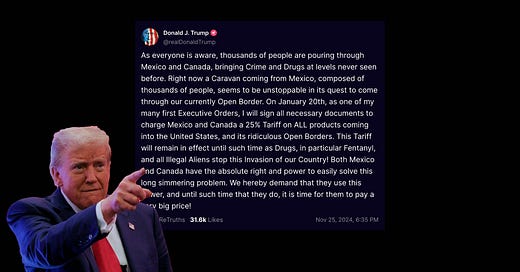Yes, you heard me. There are people in the United States and Canada who support Trump’s plan to impose tariffs on Canadian exports to the U.S. I’m not surprised, though I can hardly see how imposing tariffs on all imports could magically make Fentanyl disappear from our streets.
As a father of a high school teenager, I often receive emails from the principal about student tragedies, including overdoses. These stories hit close to home and serve as grim reminders of the Fentanyl crisis affecting so many communities. So, when Trump links tariffs to the Fentanyl crisis, I understand why some people see his proposal as a solution. Some argue that Canada’s leniency on crime justifies the U.S. using tariffs as leverage to force Canada to act.
But let’s pause for a moment. Canada is grappling with its own Fentanyl crisis. In fact, recent reports reveal that Canadian-made Fentanyl is being exported. If the Canadian government had the ability to fully address the issue, wouldn’t they have acted by now?
The frustration among conservative voters in both the U.S. and Canada is understandable. Issues like inner-city crime, substance abuse, and the troubling state of mental health are very real concerns. But when it comes to drug use, the solution isn’t as simple as targeting supply. Substance abuse also has a demand side.
Why are so many people—especially young people—turning to drugs in the first place? Why is despair so pervasive in societies like ours, where opportunities and resources should abound? Sociological research identifies family dysfunction, peer pressure, and academic stress as primary drivers of drug use. Psychological studies show that a belief in a positive future can deter substance abuse, while hopelessness often pushes people toward drugs as a coping mechanism. Stress and despair are potent triggers, and they’re far more widespread than we might want to admit.
Tariffs on Canadian exports won’t fix the Fentanyl crisis any more than waving a wand will solve all our social ills. Instead of looking for shortcuts, we need to ask deeper questions: What kind of society are we building? How can we offer young people a sense of purpose and hope? Governments cannot solve the root causes of drug use—despair, stress, and alienation—by focusing solely on supply-side measures.
I empathize with those who feel strongly about combating drug use—it’s a destructive force. But who’s to blame for the underlying problems? Progressives blame conservatives, conservatives blame progressives, and the cycle continues.
Ultimately, individuals make their own choices, and those choices have consequences. While I support harm reduction and legalization as pragmatic approaches, I recognize that no government policy can stop someone determined to engage in self-destructive behavior.
In fact, enforcement policies that focus exclusively on supply often backfire. By ignoring demand, they inadvertently hand criminal cartels a lucrative monopoly.
The demand side of the problem is harder to address, and that’s precisely why many politicians avoid it. Voters often prefer quick fixes, and tariffs might seem like one. But simple answers rarely solve complex problems. There is no magic wand for societal issues—not for substance abuse, not for despair, and certainly not for the broader challenges we face.













Share this post